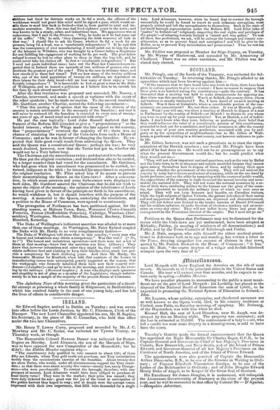be Vrobinces.
Mr. Freshfield has offered himself for the representation of the city of Hereford, upon the Conservative interest, in the room of Mr. Hob- house, who has accepted the Stewardship of the Chiltern Hundreds.— Courier.
A public meeting of the inhabitants of Leeds was convened by the Mayor, and held in the Cloth-hall yard on Monday, to petition the Queen not to prorogue Parliament until the laws restricting the trade in human food have been fully considered, and to petition Parliament for the total repeal of those laws. More than five thousand persons were present. In moving the first resolution, Mr. Hamer Stansfeld 'alluded to the. change which had taken place since his fellow-townsmen last assembled at a public meeting: then they were buoyant with the hope that the miseries of the human race were about to be alleviated, but the cup of bliss had been dashed from their lips. Mr. Stansfeld argued to prove that the aristocracy, as a class, are the enemies of the industrious class ; and the Duke of Wellington's much--condemned assertion furnished him with an illustration-
" The Duke of Wellington says this is the only country where an industri- ous and sober man can earn a comfortable independence. Hear that, ye starv- ing operatives! and bow down in grateful acknowledgment for your happy con- dition. I should like to hear from his Grace if an Irish countryman of his, who complained to me, at the Court-house, that although he and his wife and tout 4kildren had live& for thirteen weeks on 38. 6d. a week, the officers of the 'workhouse would not grant him relief until he signed a pass, which would en- able them to send him back to Ireland—that is, from partial to total and im- mediate starvation. Now, this man had lived eighteen years in the town; and Was known to be a steady, sober, and industrious man. His appearance was so cadaverous, that I said to the Overseer, Why, he looks as if he had come out of his coffin.' Oh,' he said, 'they (meaning the Irish weavers) all look in that way.' I should like to ask his Grace, whether 38. 6d a week for six persons, being 7d. a head, was a 'comfortable independence '? If he said this was the consequence of over manufacturing, I would point out to Lim the case of the labourer in Wiltshire, who was brought by a farmer before a Magistrate for not fulfilling his engagement of working for 6s. per week. The poor fellow refused because he had no other place to sleep in than the hay-loft, and he could never take his clothes off. Is that a 'comfortable independence ' ? But I need not quote individual cases; have not the Poor-law Commissioners re- ported that in Ireland there are upwards of two millions of persons who are destitute the greatest part of the year? This is the case in ordinary times, and how stands it in these bad times ? Tell me how many of the twenty millions who, out of the total population of twenty-six millions, are dependent on their labour for their daily bread—tell me how many of them enjoy a 'com- fortable independence ' ? It is lamentable to find so great a man as the Duke of Wellington, and so honest a politician as I believe him to be, tarnish his fair fame by such absurd assertions." After the first resolution was proposed and seconded, Mr. Nussey, a Chartist, intervened, and made a speech at variance with the sense of the other speakers ; but he made no motion. To the second resolution, Mr. Gardiner, another Chartist, moved the following amendment- " That this meeting is of opinion that the cause of the distress of the country is mainly attributable to the monopoly of the franchise ; and that it will never be removed till the franchise is extended to every man of twenty- one years of age, of sound mind and untainted with crime." He put the case logically : Lord John Russell declared that the framers of the Reform Bill intended to give a " preponderancy " to the landed interest ; when the Whigs made the late appeal to the country, that " preponderancy " returned the majority of 91; there was no chance of obtaining the repeal of the Corn-laws from such a House of Commons; and so he was in favour of changing the franchise. He ex- pected that little good could result from addressing the Queen. They said the Queen was a constitutional Queen : perhaps she was; he very much doubted, however, now that the Tories had got in, whether she would not be a Tory before long. The Chairman put the amendment twice ; and declared it to be carried. He then put the original resolution ; and declared that also to be carried, by a larger number than had voted for the amendment. Mr. Gardiner, who had gone when his amendment was pronounced to be carried, re- turned, indignant at the trick : he intended his amendment to supersede the original resolution. Mr. Plint asked him if he meant to prevent their memorializing the Queen on the Corn-laws ? After a conversa- tion, in which some soreness and some forbearance were displayed on both sides, Mr. Gardiner assured the Chairman that he did not wish to upset the object of the meeting : the opinion of the inhabitants of Leeds having been given in favour of the principle set forth in his amendment, he would withdraw it, lest it should interfere with the purpose of the meeting. A memorial to the Queen, embodying the resolutions, and a petition to the House of Commons, were agreed to unanimously.
The prorogation of Parliament has been petitioned against, for the standing reason, at Hulmes Town, Bury, Worcester (Town-Council) Potteries, Fenton (Staffordshire Potteries), Uxbridge, Wareham (Dor- setshire), Warrington, Shoreham, Mitcham, Bristol, Banbury, Exeter, Blateford, Kettering.
The Duke of Wellington's indiscreet assertion was alluded to at more than one of these meetings. At Warrington, Mr. Peter Ryland coupled the Duke with Mr. Hardy in no very complimentary fashion— The Duke of Wellington told them that in this country, " every man who Is honest and industrious may obtain a competency." Was this true ? ("No, no!") The honest and industrious operatives—and there were not a few of them at that meeting—knew that the assertion was false. (Cheers.) They knew that, however industrious and sober they might be, they could scarcely obtain sufficient food and clothing to keep their families alive, much less pro- vide a competency for their declining years. And then Mr. Hardy, the honourable Member for Bradford, when told that numbers of the houses in manufacturing towns were untenanted, gravely suggested as the reason, that the workpeople who formerly inhabited them have now their country resi- dences—(Laughter)—and go to town in the morning, and return in the even- ing by the railways. (Renewed laughter.) A man who displays such ignorance and stupidity is out of place as a member of the Legislature, though unfortu- nately he is but a sample of the majority of the present House of Commons.
The Aylesbury News of this morning gives the particulars of a dread- ful attempt at poisoning a whole family at Ridgmount, in Bedfordshire ; which has resulted fatally in the case of one young lady, and has left the lives of others in considerable danger.



























 Previous page
Previous page